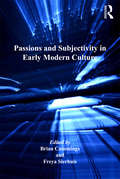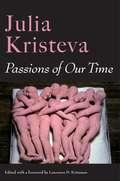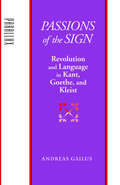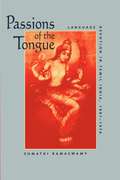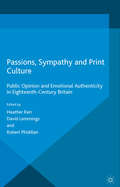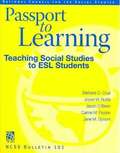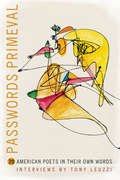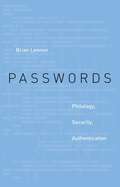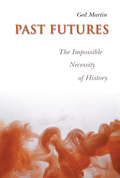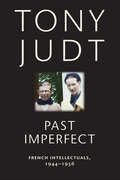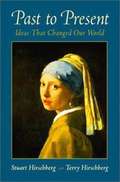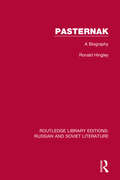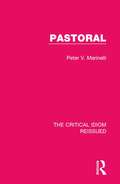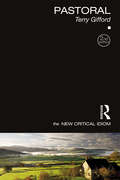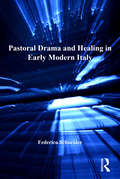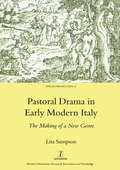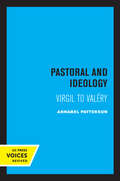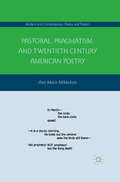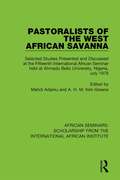- Table View
- List View
Passions Between Women: British Lesbian Culture 1668-1801
by Emma DonoghueA groundbreaking work of lesbian scholarship, Passions Between Women discovers and brings together for the first time stories of lesbian desires, acts, and identities from the Restoration to the beginning of the nineteenth century. Where previous historians have concluded that a combination of censorship and ignorance excluded lesbian experience from written history before our era, Emma Donoghue has decisively proved otherwise. She dispels the myth that seventeenth- and eighteenth-century lesbian culture was rarely registered in language and that lesbians of this period had no words with which to describe themselves. Far from being invisible, the figure of the woman who felt passion for women was a subject of confusion and contradiction: she could be put in a freak show as a "hermaphrodite," revered as a "romantic friend," or jailed as a "female husband." By examining a wealth of new medical, legal, and erotic source material, and rereading the classics of English literature, Emma Donoghue has uncovered narratives of an astonishing range of lesbian and bisexual identities in Britain between 1668 and 1801. Female pirates and spiritual mentors, chambermaids and queens, poets and prostitutes, country idylls and whipping clubs all take their place in her intriguing panorama of lesbian lives and revisionist and frankly sexual in its outlook, Passions Between Women boldly asserts that relationships between women were, more passionate than the "romantic friendships" oked by other scholarly works.
Passions and Subjectivity in Early Modern Culture
by Freya SierhuisBringing together scholars from literature and the history of ideas, Passions and Subjectivity in Early Modern Culture explores new ways of negotiating the boundaries between cognitive and bodily models of emotion, and between different versions of the will as active or passive. In the process, it juxtaposes the historical formation of such ideas with contemporary philosophical debates. It frames a dialogue between rhetoric and medicine, politics and religion, in order to examine the relationship between mind and body and between experience and the senses. Some chapters discuss literature, in studies of Shakespeare, Donne, and Milton; other essays concentrate on philosophical arguments, both Aristotelian and Galenic models from antiquity, and new mechanistic formations in Descartes, Hobbes and Spinoza. A powerful sense of paradox emerges in treatments of the passions in the early modern period, also reflected in new literary and philosophical forms in which inwardness was displayed, analysed and studied”the autobiography, the essay, the soliloquy”genres which rewrite the formation of subjectivity. At the same time, the frame of reference moves outwards, from the world of interior states to encounter the passions on a public stage, thus reconnecting literary study with the history of political thought. In between the abstract theory of political ideas and the inward selves of literary history, lies a field of intersections waiting to be explored. The passions, like human nature itself, are infinitely variable, and provoke both literary experimentation and philosophical imagination. Passions and Subjectivity in Early Modern Culture thus makes new connections between embodiment, selfhood and the emotions in order to suggest both new models of the self and new models for interdisciplinary history.
Passions of Our Time (European Perspectives: A Series In Social Thought And Cultural Criticism)
by Julia KristevaJulia Kristeva is a true polymath, an intellectual of astonishingly wide range whose erudition and insight have been brought to bear on psychoanalysis, literary criticism, gender and sex, and cultural critique. Passions of Our Time showcases recent essays of Kristeva’s that demonstrate the scope of her capacious intellect, her gifts as a stylist, and the profound contribution of her thought to the challenges of the present.The collection begins with а vivid recollection of celebrating, as a child in Bulgaria, Alphabet Day, the holiday honoring the Cyrillic letters, which proceeds outward into a contemplation of the writer as translator. Kristeva considers literature with Barthes, freedom through Rousseau, Teresa of Avila and mystical experience, Simone de Beauvoir’s dream life, and Antigone and the psychic life of women. A group of essays drawing on her psychoanalytic work delve into Freud, Lacan, maternal eroticism, and the continued importance of psychoanalysis today. In a series of striking investigations, she thinks through disability and normativity, monotheism and secularization, the need to believe and the desire to know. Calling for the courage to renew and reinvent humanism, she outlines the principles of a stance founded on the importance of respecting human life. Finally, Kristeva discusses French culture and diversity, rethinking universalism and interrogating the potential for Islam and psychoanalysis to meet, and pays homage to Beauvoir by rephrasing her dictum into the provocative “One is born woman, but I become one.”
Passions of the Sign: Revolution and Language in Kant, Goethe, and Kleist (Parallax: Re-visions of Culture and Society)
by Andreas GailusPassions of the Sign traces the impact of the French Revolution on Enlightenment thought in Germany as evidenced in the work of three major figures around the turn of the nineteenth century: Immanuel Kant, Johann Wolfgang von Goethe, and Heinrich von Kleist. Andreas Gailus examines a largely overlooked strand in the philosophical and literary reception of the French Revolution, one which finds in the historical occurrence of revolution the expression of a fundamental mechanism of political, conceptual, and aesthetic practice. With a close reading of a critical essay by Kleist, an in-depth discussion of Kant's philosophical writing, and new readings of the novella form as employed by both Goethe and Kleist, Gailus demonstrates how these writers set forth an energetic model of language and subjectivity whose unstable nature reverberates within the very foundations of society. Unfolding in the medium of energetic signs, human activity is shown to be subject to the counter-symbolic force that lies within and beyond it. History is subject to contingency and is understood not as a progressive narrative but as an expanse of revolutionary possibilities; language is subject to the extra-linguistic context of utterance and is conceived primarily not in semantic but in pragmatic terms; and theindividual is subject to impersonal affect and is figured not as the locus of self-determination but as the site of passions that exceed the self and its pleasure principle.At once a historical and a conceptual study, this volume moves between literature and philosophy, and between textual analysis and theoretical speculation, engaging with recent discussions on the status of sovereignty, the significance of performative language in politics and art, and the presence of the impersonal, even inhuman, within the economy of the self.
Passions of the Tongue: Language Devotion in Tamil India, 1891–1970 (Studies on the History of Society and Culture #29)
by Sumathi RamaswamyWhy would love for their language lead several men in southern India to burn themselves alive in its name? Passions of the Tongue analyzes the discourses of love, labor, and life that transformed Tamil into an object of such passionate attachment, producing in the process one of modern India's most intense movements for linguistic revival and separatism. Sumathi Ramaswamy suggests that these discourses cannot be contained within a singular metanarrative of linguistic nationalism and instead proposes a new analytic, "language devotion." She uses this concept to track the many ways in which Tamil was imagined by its speakers and connects these multiple imaginings to their experience of colonial and post-colonial modernity. Focusing in particular on the transformation of the language into a goddess, mother, and maiden, Ramaswamy explores the pious, filial, and erotic aspects of Tamil devotion. She considers why, as its speakers sought political and social empowerment, metaphors of motherhood eventually came to dominate representations of the language.
Passions, Sympathy and Print Culture: Public Opinion and Emotional Authenticity in Eighteenth-Century Britain (Palgrave Studies in the History of Emotions)
by David Lemmings Heather Kerr Robert PhiddianThis book explores ways in which passions came to be conceived, performed and authenticated in the eighteenth-century marketplace of print. It considers satire and sympathy in various environments, ranging from popular novels and journalism, through philosophical studies of the Scottish Enlightenment, to last words, aesthetics, and plastic surgery.
Passport Reading Journeys™ II, Student Book, Part A
by Voyager Expanded LearningNIMAC-sourced textbook
Passport Reading Journeys™ II, Student Book, Part B
by Voyager Expanded LearningNIMAC-sourced textbook
Passport Reading Journeys™ II, Student Book, Part C
by Voyager Expanded LearningNIMAC-sourced textbook
Passport to Learning: Teaching Social Studies
by Joyce W. Nutta Barbara C. Cruz Jason O'BrienPassport to Learning: Teaching Social Studies
Passwords Primeval: 20 American Poets in their Own Words (American Readers Series)
by Interviews by Tony LeuzziPasswords Primeval sets aside the artificial boundaries of poetry "schools" and "movements" to cut to the art of the matter. Tony Leuzzi's astounding knowledge of poetry draws new insights from such luminaries as Billy Collins, Gerald Stern, Jane Hirshfield, Patricia Smith, and Martín Espada. These new interviews provide insights into the poets and their poems without losing any of their mystery. Whether you're looking for deeper understanding of your favorite poets or simply interested in the lives of contemporary artists, Passwords Primeval reveals the interconnectedness of these masters whose voices echo each other from opposite ends of the same canyon.
Passwords: Philology, Security, Authentication
by Brian LennonCryptology, the mathematical and technical science of ciphers and codes, and philology, the humanistic study of natural or human languages, are typically understood as separate domains of activity. But Brian Lennon contends that these two domains, both concerned with authentication of text, should be viewed as contiguous. He argues that computing’s humanistic applications are as historically important as its mathematical and technical ones. What is more, these humanistic uses, no less than cryptological ones, are marked and constrained by the priorities of security and military institutions devoted to fighting wars and decoding intelligence. Lennon’s history encompasses the first documented techniques for the statistical analysis of text, early experiments in mechanized literary analysis, electromechanical and electronic code-breaking and machine translation, early literary data processing, the computational philology of late twentieth-century humanities computing, and early twenty-first-century digital humanities. Throughout, Passwords makes clear the continuity between cryptology and philology, showing how the same practices flourish in literary study and in conditions of war. Lennon emphasizes the convergence of cryptology and philology in the modern digital password. Like philologists, hackers use computational methods to break open the secrets coded in text. One of their preferred tools is the dictionary, that preeminent product of the philologist’s scholarly labor, which supplies the raw material for computational processing of natural language. Thus does the historic overlap of cryptology and philology persist in an artifact of computing—passwords—that many of us use every day.
Past Futures
by Ged MartinBy nature, human beings seek to make sense of their past. Paradoxically, true historical explanation is ultimately impossible. Historians never have complete evidence from the past, nor is their methodology rigorous enough to prove causal links. Although it cannot be proven that 'A caused B,' by redefining the agenda of historical discourse, scholars can locate events in time and place history once again at the heart of intellectual activity.In Past Futures, Ged Martin advocates examining the decisions that people take, most of which are not the result of a 'process,' but are reached intuitively. Subsequent rationalizations that constitute historical evidence simply mislead. All historians can do is to locate them in time, to explain not why a decision was taken, but why then? To illustrate, Martin asks a number of questions: What is a 'long time' in history? Are we close to the past or remote from it? Is democracy a recent experiment, or proof of our arrival at the end of a journey through time? Can we engage in a historical dialogue with the past without making clear our own ethical standpoints? Although explanation is ultimately impossible, humankind can make sense of its location in time through the concept of 'significance,' a device for highlighting events and aspects of the past. In so doing, Martin suggests a radical new approach to historical discourse.
Past Imperfect: French Intellectuals, 1944-1956
by Tony JudtA &“marvelously readable&” critique of Sartre, Camus, de Beauvoir, and other French postwar intellectuals that &“consistently entertains and provokes&” (The Washington Post). The uniquely prominent role of French intellectuals in European cultural and political life following World War II is the focus of this book by the acclaimed author of Postwar: A History of Europe Since 1945. Tony Judt analyzes this intellectual community&’s most divisive conflicts: how to respond to the promise and the betrayal of Communism and how to sustain a commitment to radical ideals when confronting the hypocrisy in Stalin&’s Soviet Union, in the new Eastern European Communist states, and in France itself. Judt shows why this was an all-consuming moral dilemma to a generation of French men and women, how their responses were conditioned by war and occupation, and how postwar political choices have come to sit uneasily on the conscience of later generations of French intellectuals. Judt&’s analysis extends beyond the writings of fashionable &“existentialist&” personalities such as Jean-Paul Sartre, Albert Camus, and Simone de Beauvoir to include a wide intellectual community of Catholic philosophers, non-aligned journalists, literary critics and poets, Communist and non-Communist alike—and asserts that what he calls the &“moral irresponsibility&” of those years damaged France&’s cultural standing, and reflected the nation&’s larger difficulty in confronting its own ambivalent past. &“A forthright and uncommonly damning study of those intellectually volatile years . . . indicts these intellectuals for their inhumanity in failing to test their political thought against political reality.&” —The New York Times Book Review &“Brilliant . . . splendidly written.&” —Foreign Affairs
Past To Present: Ideas That Changed Our World
by Stuart Hirschberg Terry HirschbergComprehensive and accessible, Past to Present encapsulates for readers essential readings from the fields of humanities, social science, and science in a single book- putting a "human face" on the great ideas that have changed our world. The book is divided into seven thematic parts that trace the history of important ideas from their roots to their current incarnations. Each of the 73 readings includes discussions that focus on the history of the idea, the writer's rhetorical strategies, and the context in which the piece was written. For anyone who is interested in exploring the evolutions of the great ideas of our world.
Pasternak: A Biography (Routledge Library Editions: Russian and Soviet Literature #8)
by Ronald HingleyThis biographical study, first published in 1985, draws on extensive newly available material and illuminates the life and work of a man who lived through one of the most turbulent periods of Russian history to produce some of his country’s greatest poetry and its most significant modern novel.
Pastoral (The Critical Idiom Reissued #14)
by Peter V. MarinelliFirst published in 1971, this book explores the theme of the pastoral in literature and the way in which it adapts itself to various forms. It examines some of the ways in which it has manifested itself, such as ‘the golden age’, ‘Arcadia’, ‘Sparta’ and childhood, whilst also identifying the central and unchanging core of meaning in the pastoral convention.
Pastoral (The New Critical Idiom)
by Terry GiffordUpdated throughout, this new edition provides a clear and invaluable introduction to the study of Pastoral. Terry Gifford traces the history of the genre from its classical origins through to contemporary writing and introduces the major writers and critical issues relating to Pastoral. Gifford breaks the term down into three accessible concepts: Pastoral, Anti-Pastoral, Post-Pastoral and provides up-to-date examples from literature and film. New chapters explain the continuing tradition of Georgic literature and the recent evolution of Pastoral in their historical contexts. Pastoral is essential and engaging reading for students and academics alike.
Pastoral Drama and Healing in Early Modern Italy
by Federico SchneiderPastoral Drama and Healing in Early Modern Italy represents the first full-length study to confront seriously the well-rehearsed analogy of the pastoral poet as healer. Usually associated with the edifying function of the Renaissance pastoral, this analogy, if engaged more profoundly, raises a number of questions that remain unanswered to this day. How does the pastoral heal? How exactly do the inner workings of the text cater to the healing? What socio-cultural conventions make the healing possible? What are the major problems that pastoral poetry as mimesis must overcome to make its healing morally legitimate? In the wake of Derrida's seminal work on the Platonic pharmakon, which has in turn led recent criticism to formulate a much more concrete understanding of the theater/drug analogy, the stringent approach to the therapeutic function of the Renaissance pastoral offered in this work provides a valuable critical tool to unpack the complexity contained within a little-understood cliché.
Pastoral Drama in Early Modern Italy: The Making of a New Genre
by Lisa Sampson"Emerging in Italy in the mid-sixteenth century, pastoral drama is one of the most characteristic genres of its time. Sampson traces its uneven development into the following century by exploring masterpieces by Tasso and Guarini, and many lesser known works, some by women writers. She examines the treatment of key themes of love, the Golden Age, and Nature and Art against the background of the textual and stage production of the plays. An investigation of critical writings associated with the genre further reveals its significance to the contemporary literary scene, by stimulating 'modernizing' attitudes towards the canon, as well as new enquiries into the function and possibilities of art."
Pastoral and Ideology: Virgil to Valéry
by Annabel PattersonPatterson follows the fortunes of Virgil’s Eclogues from the Middle Ages to our own century. She argues that Virgilian pastoral spoke to the intellectuals of each place and time of their own condition. The study reinspects our standard system of periodization in literary and art history and challenges some of the current premises of modernism. This title is part of UC Press's Voices Revived program, which commemorates University of California Press’s mission to seek out and cultivate the brightest minds and give them voice, reach, and impact. Drawing on a backlist dating to 1893, Voices Revived makes high-quality, peer-reviewed scholarship accessible once again using print-on-demand technology. This title was originally published in 1987.
Pastoral, Pragmatism, and Twentieth-Century American Poetry
by Ann Marie MikkelsenIn the first expansive study of American pastoral since Leo Marx's The Machine in the Garden , Mikkelsen reinvigorates discussion of this literary mode as a form of cultural commentary whose subjects extend beyond the simple or rustic life to encompass the major social, economic, and political transformations of the past century.
Pastoralists of the West African Savanna: Selected Studies Presented and Discussed at the Fifteenth International African Seminar held at Ahmadu Bello University, Nigeria, July 1979 (African Seminars: Scholarship from the International African Institute #1)
by Mahdi Adamu A. H. M. Kirk-GreeneOriginally published in 1986, this volume deals with various aspects of the life of the pastoralists who live in the area between what was Senegambia and Cameroon. It analyses the changing relations between pastoralists and agricultural peoples, and the changes that pastoral societies are undergoing with urbanisation, increased central government control and the spread of market relations. The papers are in both English and French and include historical studies of aspects of the history of Adamawa, the Fulani, the Twareg, the Shuwa Arabs and the Koyam in pre-colonial times. There is also a survey of the state of Fula language studies and the variety of Fula literature; discussions of the changing nature of pastoralism and the nomadic way of life in Cameroon, Senegal and Nigeria, including the effects of drought.

